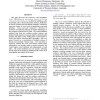Free Online Productivity Tools
i2Speak
i2Symbol
i2OCR
iTex2Img
iWeb2Print
iWeb2Shot
i2Type
iPdf2Split
iPdf2Merge
i2Bopomofo
i2Arabic
i2Style
i2Image
i2PDF
iLatex2Rtf
Sci2ools
115
click to vote
ICAD
2004
2004
Reeds: A Responsive Sound Installation
This paper discusses the responsive sound installation Reeds. The Melbourne International Festival of the Arts commissioned the Reeds project in 2000, for exhibition on the Ornamental Lake at the Royal Botanic Gardens, Melbourne. It consists of twenty-one large floating sculptures1 , modeled to represent clusters of river reeds in immaculate man-made plantings. Each reed pod2 contained a collection of electronics for either the gathering of weather information or the reception and dispersion of sound. The sound installation gathered data from two realtime weather stations, and produced eight channels of musical output by interpreting the machine unit pulses of the weather data as pulse inputs to Inverse Fast Fourier Transform (IFFT) algorithms. The Reeds project focused on a consideration of multiple streams of chaotic and constantly varying sound. I was interested in exploring whether the sonic environment would remain homogenous even though, unlike a musical ensemble, the control in...
Emerging Technology | ICAD 2004 | Reeds Project | Responsive Sound Installation | Sound Installation |
Related Content
| Added | 31 Oct 2010 |
| Updated | 31 Oct 2010 |
| Type | Conference |
| Year | 2004 |
| Where | ICAD |
| Authors | Garth Paine |
Comments (0)

